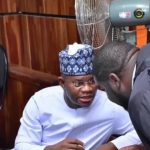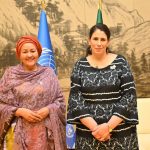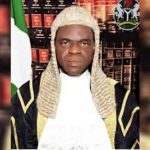Crisis in the Centre: Can Nigeria Reclaim Security, Stability, and Sovereignty?
By Dr. Aiyeku Olufemi Samuel
Co-Founder & Lead Consultant, Global Human Capital & Energy Management Limited
Governance Analyst | Development Economist | Policy Consultant | Strategic Development Advocate | Climate Action Enthusiast | Sustainability & Impact Investing Specialist | Girl-child Advocacy | PPP & CRM Specialist
“Security has given way to danger, wealth to poverty, peace to crisis, and the Central Administration cannot hold.”
— A Contemporary Nigerian Lament
Introduction: When the Centre Can No Longer Hold
Nigeria today faces a dangerous convergence of crises: insecurity, poverty, political uncertainty, inflation, and loss of institutional trust. What happens when the foundation of a nation begins to crack from within? When citizens fear not just the unknown, but the familiar—roads, markets, schools, and even sacred places?
Has Nigeria become a country where the ordinary is no longer safe and the future is no longer sure?
Can we rise from this abyss? Or are we witnessing the silent erosion of the nation’s soul?
This article unpacks the roots of this dysfunction, evaluates the dangerous shift from security to lawlessness, and offers data-driven, policy-focused insights for national rebirth.
A Nation Under Siege
Across all six geopolitical zones, insecurity is no longer sporadic—it is systemic.
Over 63,111 people have died from violent attacks in Nigeria since 2011 (Council on Foreign Relations’ Nigeria Security Tracker).
According to SBM Intelligence (2023), 2,423 people were kidnapped in the first half of 2023 alone, with millions paid as ransom.
Banditry in the Northwest, insurgency in the Northeast, farmer-herder conflicts in the Middle Belt, and gang violence in the South have stretched security forces beyond operational limits.
Where do we run when there is no sanctuary?
What is the value of a nation that cannot guarantee its people safety within its borders?
From Wealth to Poverty – The Economic Collapse
The National Bureau of Statistics (NBS) reported that over 133 million Nigerians live in multidimensional poverty. Inflation, unemployment, and currency instability have eroded middle-class income and enterprise capital.
As of May 2024, food inflation crossed 40%, driven by insecurity in farmlands and poor transportation logistics.
Over 33% of youth remain unemployed—creating fertile ground for radicalization and crime.
The Naira has lost over 65% of its value against the dollar in the last 2 years, with little structural intervention.
The Central Bank’s monetary interventions are often reactive, while governance remains disconnected from grassroots realities.
So, we ask:
How does a nation prosper when its people are hungry and hopeless?
Isn’t poverty the new weapon of mass destruction—silently killing potential, dreams, and unity?
When Peace is No Longer a Public Good
Peace has become scarce—replaced by protests, agitation, tribal mistrust, and disillusionment. From #EndSARS to regional secessionist movements, from looting to youth restiveness, the fragility of peace is becoming clearer.
Is Nigeria’s peace an illusion maintained by the silence of the powerless?
When young people lose trust in the ballot, when judges lose public confidence, when military operations fail to restore order, we are staring at a nation slowly burning from within.
“Where justice is denied, where poverty is enforced, and where ignorance prevails… neither persons nor property will be safe.”
— Frederick Douglass
Central Administration in Paralysis
Nigeria’s federal governance structure has become a rigid relic, unable to respond swiftly to modern threats. The centre concentrates power, yet lacks capacity.
Federal policing is inadequate—one police officer to 600 Nigerians (far below the UN recommendation of 1:450).
State governors are “chief security officers” in name, but powerless in practice.
Revenue distribution favours federal agencies, yet infrastructure at state and local levels is collapsing.
How long can we pretend the current system works when federal command fails to deliver local safety and growth?
Is restructuring a taboo or the only real solution?
A Call to Rebuild, Not Just Reform
Nigeria needs urgent recalibration—not just policies, but a national reawakening.
We cannot continue to manage dysfunction. We must dismantle and rebuild where necessary.
Key Action Points:
Constitutional Review to restructure power to subnational levels for efficient security and economic governance.
National Security Architecture Overhaul—community policing, regional intelligence coordination, and judicial reforms for quick prosecution.
Economic Diversification with Rural Investment—youth agri-enterprise zones, solar-powered rural economies, and access to credit through fintech.
A National Ethics Reorientation Campaign—rebuilding trust, values, and patriotism through civic education, media, and religious institutions.
Conclusion: A Nation in Waiting
Nigeria is not failing because of its people—it is failing because of its systems.
We must return to accountability, shared prosperity, and localized governance.
So we ask again:
What will history remember us for—our silence or our solutions?
Will we rebuild this nation or inherit its ruins?
If the centre cannot hold, what are we doing to empower the regions?
“A nation grows great when its people plant trees under whose shade they may never sit.”
— Greek Proverb
Let us plant those trees—through policy, leadership, and courage.
Dr. Aiyeku Olufemi Samuel
Governance Analyst | Development Economist | Policy Consultant
Co-Founder & Lead Consultant,
Global Human Capital & Energy Management Limited
Email: aiyekuolufemi@gmail.com|
0802 545 1262 | 0803 786 6085











